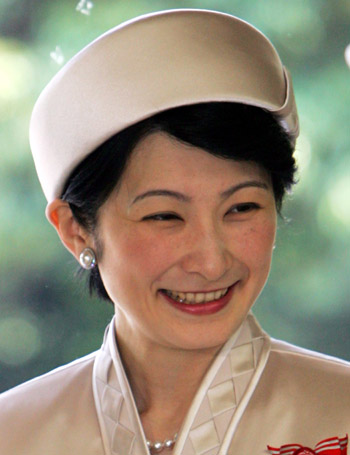Asia-Pacific
Japan weeklies predict princess to bear male heir
(Reuters)
Updated: 2006-07-27 10:08
 |
Large Medium Small |
Japan's royal baby isn't due for weeks, but popular magazines, never shy about probing the secrets of the great and famous, have already decided that the imperial family is about to welcome its first male heir in over 40 years.
 Japanese Princess Kiko, wife of Emperor Akihito's second son Prince Akishino, smiles as she leaves a general meeting of the Japanese Red Cross Society in Tokyo in this May 25, 2006 file photo.[Reuters] |
Speculation over whether Princess Kiko, 39, the wife of the emperor's younger son, will give birth to a boy has simmered since an announcement in February that she was pregnant with her third child.
But news last week that Kiko would probably give birth ahead of her late September due date through a Caesarean operation has prompted a spate of confident predictions by the tabloid media.
"The birth of a boy!" trumpeted one headline in the weekly Shukan Post. Other magazines have run similar articles.
No males have been born into the imperial family since Kiko's husband, Prince Akishino, in 1965 and the government had planned to introduce a bill to avert a succession crisis by revising a 1947 law to give women equal rights to inherit the throne.
Kiko's pregnancy, however, prompted the government to put off the plan, which was bitterly opposed by conservatives keen to preserve a males-only tradition they say stretches back more than 2,000 years.
The Imperial Household Agency, which handles royal affairs, is maintaining a frosty silence on the question of gender.
"We don't know, and we would not comment about it if we did," a spokesman for the agency said. "The parents themselves say they don't want to know until the baby is born." But the mention of a Caesarean has many magazines speculating that special care is being taken to ensure the safe birth of a male heir, and royal watchers agree that the baby's gender may already be known.
"Despite what is being said publicly, in this day and age it's very possible to discover the gender prior to birth," said Tomoko Inukai, an independent social commentator.
Some ordinary Japanese also suspect Kiko and Akishino, who have two daughters, aged 14 and 11, know a son is on the way.
"I think it will be a boy," said a 58-year-old woman taking a break near a subway station in central Tokyo.
"It seems to be a planned pregnancy," she said, adding that personally, she favoured letting women inherit the throne.
Opinion polls conducted after news of Kiko's pregnancy showed a majority of the public supports letting women ascend the throne and pass it on to their children, although many felt there was no need to rush through the legislation since Kiko was pregnant.
The weeklies are also paying close heed to the timing of the birth. A late August birth would coincide with an unprecedented overseas vacation in Holland by Crown Prince Naruhito, Crown Princess Masako and their daughter, 4-year-old Princess Aiko.
Under current law -- which limits succession to males descended from the paternal line -- Kiko's son would be third in line to the throne.
Revising the law would put Aiko on track to become Japan's first ruling empress since the 18th century. Japan has had eight reigning empresses as emergency caretakers, but none passed the throne on to a child who was not descended from an emperor.
The trip abroad by Masako and Naruhito is thought to be an effort to help the 42-year-old Harvard-educated former diplomat recover from a mental illness caused by the stress of adapting to rigid royal life, including pressure to bear a male heir.
Many of the magazines say it is also aimed at sparing her the strain of celebrations that would mark the birth of a boy.
For some Japanese, the birth of a male heir would indeed be a cause for joy that an ancient tradition need not be broken.
"It's not good to change something that's continued for thousands of years just to accommodate shifting circumstances," said one 38-year-old man employed in the mass media industry as he took a cigarette break in a small Tokyo park.
For others, though, the question of gender is moot.
"Whether you're male or female doesn't matter these days. What's important is what you can do as a person," one 28-year-old white collar worker said as he sipped coffee at an outdoor cafe.